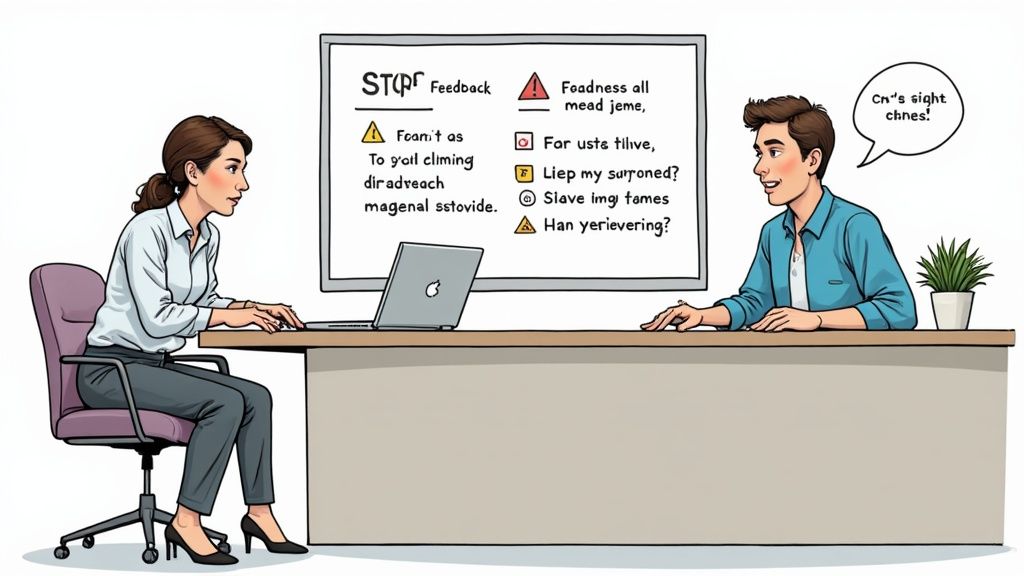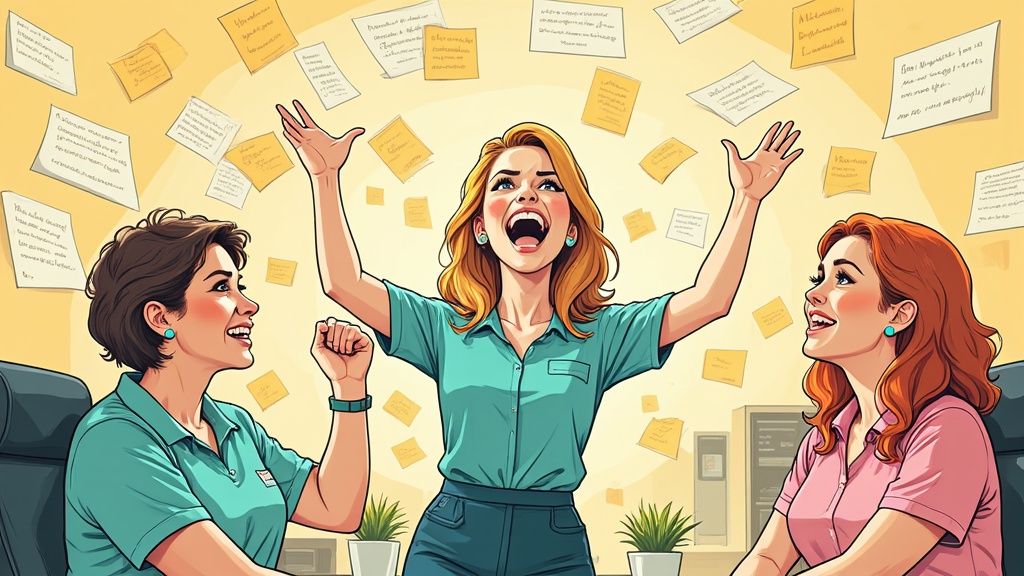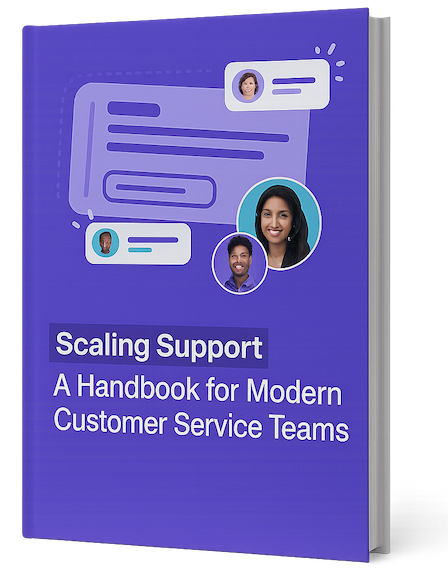Customer service coaching has become essential for business success as expectations for exceptional experiences continue rising. When done well, coaching transforms service teams into high performers who consistently deliver outstanding support. The results ripple throughout the organization, improving both employee satisfaction and customer experience metrics.
The Power of Investing in Your Team
Companies that prioritize customer service coaching see significantly higher employee retention rates. Just as a well-coached sports team tends to win more games and keep their players motivated, organizations that invest in developing their service staff create an environment where people feel valued and want to stay. Research shows that 94% of employees are more likely to remain at companies that support their professional growth through coaching and development. By implementing strong coaching programs, businesses can dramatically reduce costly turnover.
From Average Performers to Customer Service Champions
Effective customer service coaching goes far beyond basic product training. The best programs focus on building fundamental skills that give agents confidence in any customer interaction. This includes developing active listening abilities, practicing empathy, mastering conflict resolution, and learning crisis management techniques. Regular practice with product knowledge ensures agents can quickly and accurately address customer questions. When these skills come together, average performers become exceptional customer service professionals.
The Data-Driven Approach to Coaching
Smart organizations use metrics like Customer Satisfaction scores, First Contact Resolution rates, and Net Promoter Scores to shape their coaching strategies. This data highlights specific areas where agents need support. For example, if metrics show agents struggling to maintain brand voice in their communications, coaches can focus on techniques to improve those skills. Taking a data-driven approach ensures coaching efforts align with business goals and deliver clear results.
Building a Culture of Continuous Learning
Unlike one-time training sessions, ongoing coaching creates an environment of constant growth and development. Regular feedback and support help agents refine their abilities and adapt as customer needs evolve. Using coaching software to track progress and provide timely guidance leads to major improvements in both agent performance and customer satisfaction. This approach builds a dynamic culture where learning never stops and agents feel empowered to keep developing their skills.
Building Your Data-Driven Coaching Framework
To create effective customer service coaching, teams need concrete data and structured methods, not just instincts and guesswork. Smart service teams look at performance metrics, customer feedback, and quality scores to find specific areas where coaching can make the biggest difference for agent growth and customer happiness.
Identifying Key Performance Indicators (KPIs)
Start by choosing KPIs that match what your business wants to achieve. These numbers show how your team is doing and help focus coaching where it’s needed most. For example, if you aim to make customers happier, pay close attention to Customer Satisfaction (CSAT) scores and Net Promoter Score (NPS). The First Contact Resolution (FCR) rate and Average Handle Time (AHT) reveal how efficiently agents work and where coaching could streamline their process. Picking the right KPIs that connect to your goals sets the foundation for coaching that gets results.
Creating Actionable Coaching Moments from Data
Raw numbers only tell part of the story – the real value comes from turning those insights into practical coaching opportunities. For instance, if you notice CSAT scores consistently drop on Mondays, that’s worth investigating further. You might discover agents need extra support during busy periods or there are recurring technical issues to address. Looking for patterns in your data helps uncover the root causes of performance gaps. This lets you design targeted coaching that prevents problems before they happen, making both agents and customers happier.
Using Quality Scores to Refine Coaching
Quality assurance (QA) scores add important details beyond basic metrics by evaluating individual customer interactions. These scores show how well agents communicate, understand products, and represent your brand voice. For example, if QA reveals agents struggle with empathy during difficult conversations, coaching can focus on building those specific skills. Using real examples from actual customer interactions makes coaching more relevant and leads to clear improvements in how agents perform.
Tracking Progress and Demonstrating ROI
To show the value of customer service coaching, you need to monitor progress and measure results over time. Regularly checking your chosen KPIs reveals how coaching impacts performance. For example, if you see FCR rates climb after implementing product knowledge training, that’s clear proof your coaching works. Tracking also helps you adjust coaching methods to keep getting better results. Tools like Supportman can help by putting metrics right into communication tools like Slack, making it easy for teams to see data and keep improving based on what they learn.
Creating a Culture of Continuous Learning
Customer service teams thrive when learning is woven into their daily work, not limited to one-time training sessions. By building a culture focused on ongoing skill development, teams can better adapt to customer needs and deliver excellent service. Let’s explore how to create an environment where continuous learning flourishes.
Why Traditional Training Falls Short
One-off training sessions during onboarding miss the mark in preparing agents for real customer interactions. Without regular practice and feedback, agents struggle to apply concepts like conflict resolution when faced with challenging situations. Initial product training, while important, isn’t enough to help agents handle the diverse scenarios they encounter daily. Teams need consistent opportunities to refine their skills and learn from experience.
The Benefits of Ongoing Customer Service Coaching
Regular coaching sessions create a feedback loop that helps agents grow professionally. Through consistent guidance, agents can identify improvement areas and develop new approaches to customer interactions. This ongoing support builds confidence and ownership over their development. Research shows this investment pays off – 94% of employees are more likely to stay at companies that support their growth through coaching and training.
Practical Strategies for Continuous Learning
Making learning part of daily work requires more than scheduling coaching sessions. Here are key approaches that work:
- Quick-Reference Materials: Create easily accessible resources like FAQs and product guides that agents can quickly reference during customer interactions. Having information readily available helps agents resolve issues faster and more effectively on first contact.
- Effective Coaching Software: Tools like Supportman help streamline feedback by connecting customer input directly to communication platforms like Slack. This enables real-time coaching and performance tracking so managers can provide targeted support where needed.
- Motivational Feedback Systems: Design feedback processes that encourage growth through regular reviews, peer feedback, and recognition of achievements. For example, celebrate improved customer satisfaction scores and highlight exceptional service interactions to motivate continuous improvement.
Building Learning Programs That Stick
For continuous learning to succeed, programs must connect directly to agents’ daily work. Mix different learning formats like role-playing exercises, case studies, and online modules to keep agents engaged and accommodate various learning styles. Regularly evaluate program effectiveness using agent feedback and performance metrics, then adjust based on what’s working. By investing in ongoing team development, you create an environment where excellent customer service becomes the norm.
Measuring What Matters in Coaching Success

So you’ve built a solid coaching framework and learning culture – but how do you know if your customer service coaching is actually making an impact? The key lies in measuring concrete results that affect both your bottom line and the customer experience. By tracking specific metrics, you can see exactly how your coaching efforts translate into business outcomes.
Key Performance Indicators (KPIs) for Coaching
Just like you track overall business performance, certain metrics can reveal whether your coaching program is working. These measurements often overlap with standard customer service KPIs, showing the direct connection between effective coaching and better results. Here are the most important metrics to watch:
- Customer Satisfaction (CSAT) Score: This directly shows if customers are happy with their service. When CSAT scores improve after coaching, it means your agents are successfully applying what they’ve learned to create better customer interactions.
- First Contact Resolution (FCR) Rate: This tells you how often issues get solved on the first try. Good coaching typically leads to higher FCR rates since agents develop stronger problem-solving abilities. When agents have the right skills and knowledge, they can handle issues completely the first time around.
- Average Handle Time (AHT): While speed matters, quality is crucial too. The goal is finding the sweet spot between quick service and thorough support. Effective coaching helps agents work efficiently while still giving customers the attention they need.
- Net Promoter Score (NPS): This measures if customers would recommend your business to others. When coaching helps create consistently positive experiences, customers are more likely to become advocates for your brand.
Demonstrating Return on Investment (ROI)
Measuring success goes beyond just tracking numbers – you need to show stakeholders the real value of your coaching program. This means connecting improved metrics to concrete business results, like reduced costs or increased revenue. For example, when FCR rates go up, you spend less on repeat contacts while making customers happier. Making these direct links between coaching, metrics, and business impact helps secure ongoing support for your program.
Qualitative Data: The Human Element
While numbers tell part of the story, don’t forget about qualitative feedback. Getting input directly from agents about their coaching experience reveals ways to make the program even better. This could include thoughts on coaching style, training materials, or session frequency. Tools like SupportMan work great for gathering this feedback through platforms like Slack, making it simple to track and address agent input.
Refining Your Coaching Strategy
Success measurement isn’t a one-time thing – it’s an ongoing process. By regularly reviewing your KPIs and collecting agent feedback, you can keep improving your coaching approach. If metrics show strong FCR but lagging CSAT, for instance, you might need to focus more on communication skills. Using data to guide these adjustments creates a cycle of growth that benefits both your team and customers. This constant fine-tuning helps you stay ahead of changing customer needs while keeping your coaching program valuable and relevant.
Developing Coaches Who Transform Teams

The success of any customer service team depends heavily on the quality of its coaches. Much like in sports, where a great coach can unite individual players into a winning team, customer service coaches shape agent performance and drive results. Let’s explore the key elements that help organizations develop exceptional coaches who can elevate their teams.
Mastering the Art of Feedback
Great coaches excel at giving constructive feedback that agents can act on. Instead of vague criticisms, they offer specific suggestions tied to clear outcomes. For instance, rather than saying “Your tone needs work,” an effective coach might advise: “Try speaking more softly and using positive phrases like ‘I can help with that’ rather than focusing on limitations.” This targeted approach helps agents understand exactly what to adjust and why it matters for the customer experience.
Building Trust and Rapport
Coaching is fundamentally about relationships built on mutual trust and respect. The best coaches create an environment where agents feel safe sharing challenges and asking questions openly. They practice active listening, showing genuine interest in their agents’ growth and concerns – the same way they expect agents to listen carefully to customers. When coaches demonstrate empathy and support, agents feel more motivated to improve and try new approaches.
Identifying and Nurturing Coaching Talent
Finding the right people to become coaches requires looking beyond just product knowledge and experience. The most successful coaches combine strong communication abilities with natural talent for teaching and relationship-building. They’re skilled at providing constructive feedback, motivating others, and fostering positive team dynamics. Organizations should invest in these individuals through focused training on coaching techniques and performance management, while providing ongoing development to help them stay current with best practices.
Maintaining Consistency Across Large Teams
For bigger organizations, keeping coaching consistent across multiple teams takes careful planning. Clear guidelines and frameworks help ensure all coaches follow similar standards for evaluating performance, delivering feedback, and tracking metrics. Regular calibration sessions between coaches reinforce these standards. Tools like Supportman integrated with Slack can help by providing a central hub for sharing information, giving feedback, and monitoring performance data.
Adapting to Evolving Service Standards
Customer service needs and expectations change regularly. To stay effective, coaching programs must evolve alongside them. This means regularly updating training materials, incorporating new tools and techniques into coaching sessions, and having ongoing discussions about industry trends. When organizations commit to continuous improvement in their coaching approach, they create an environment where both coaches and agents can grow – leading to better customer experiences and sustainable business success.
Essential Skills That Define Service Excellence

Great customer service comes down to having both strong technical abilities and well-developed soft skills. Support teams need expertise to solve problems effectively while also building meaningful connections that make customers feel valued. Let’s explore the key skills that top-performing service teams master and how coaching helps develop them.
Mastering the Art of Communication
Clear and empathetic communication is fundamental to positive customer interactions. This means listening carefully to understand needs, responding thoughtfully, and maintaining a constructive tone – even in difficult situations. For example, rather than reciting policy, a skilled agent might say “I hear how frustrating this is. While we have certain guidelines, let’s look at what options we do have to help.” This approach validates the customer’s experience while working within company parameters. Regular coaching helps teams refine these communication techniques.
Developing Emotional Intelligence
Handling complex customer situations requires emotional intelligence – the ability to manage your own emotions while tuning into and appropriately responding to customers’ emotional states. Like an orchestra conductor who must control their own tempo while guiding different instruments into harmony, agents with strong emotional intelligence can defuse tense exchanges, connect with customers, and turn potentially negative experiences into positive ones. Role-playing exercises and simulations during coaching sessions help build these skills.
Honing Problem-Solving Abilities
Effective problem-solving goes beyond following standard procedures. It requires critical thinking, flexibility, and analyzing each unique situation to find optimal solutions. This might mean exploring creative fixes, collaborating with colleagues, or knowing when to escalate appropriately. For instance, when a customer has an ongoing technical issue, a strong problem-solver will look beyond the immediate fix to suggest preventive measures. Case studies and real scenarios in coaching help agents sharpen these capabilities.
Cultivating Product Expertise and Process Knowledge
While interpersonal skills are crucial, they must be paired with deep product and process understanding to provide accurate, efficient solutions. Just as craftspeople must know their tools intimately, support agents need comprehensive knowledge of their products and services. This expertise lets them confidently guide customers to resolutions. Regular product training and up-to-date resources are essential parts of coaching programs.
The Power of Role-Playing and Simulation Training
Practice scenarios and simulated customer interactions provide invaluable experience in a low-pressure environment. Like pilots training in flight simulators, these exercises let agents apply new skills, get feedback, and refine their approach before working with real customers. The practice builds confidence and competence for handling diverse customer needs. Coaching programs use these techniques to accelerate skill development.
Tired of inconsistent customer service and struggling to meet rising customer expectations? Supportman integrates seamlessly with Slack to provide real-time feedback, empowering your team to deliver exceptional service.


